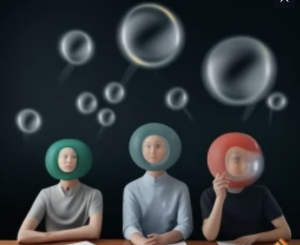While “codependent” is not a clinical diagnosis or recognized personality disorder, it remains a widely- used term for someone who’s self-sacrificing, a caregiver who gives at the expense of her own well-being, and who enables her partner’s addictive or self-destructive behavior. These tendencies show up in many forms, and are about much more than self-sacrifice and enabling addiction. In fact, there’s a whole aspect of what we call “codependency” that many are not aware of—a way of being in a relationship which is considered normal, but is dysfunctional at its core. While it may not produce the destructive consequences of enabling a partner’s addiction, this hidden codependency comes with its own fierce consequences, namely, the abandonment and loss of yourself and the erosion of your self-esteem.
Hidden codependency, in a nutshell, is I’m not okay if we’re not okay, and even more to the point, I’m not okay if you’re not okay—with me. When you struggle with this issue, conflict in your relationship is profoundly disturbing to your well-being. You need the relationship to be conflict-free in order to maintain your own equilibrium. It’s frightening and anxious-making when your relationship is not in a good place; you feel as if you must immediately do whatever it takes to reestablish peace and get back your partner’s approval—essentially, to make the relationship good again.
When you live with this kind of insecurity, you’re constantly managing, adjusting, repressing, and apologizing for your thoughts and feelings. You may have difficulty communicating truthfully and setting boundaries because doing so might risk being displeasing to your partner and therefore disruptive to the relationship. Simultaneously, you may not be able to identify your own feelings, wants, and needs, as you are hyper-focused on what your partner feels, wants, and needs, how they’re doing, and most of all, how they’re doing with you. Your self-esteem is reliant on your partner’s perception of you and not your own self-experience. Ultimately, your partner liking you is more important than you liking you, and harmony in the relationship comes at the cost of being in a relationship with yourself.
Hidden “codependency” keeps your nervous system in a tenuous and fragile state; your well-being is reliant on someone else’s: your partner’s. If your partner comes home in a bad mood, you are destabilized until they’re okay again and things between you are back to smooth sailing. And usually, you assume that your partner’s not-okayness is a result of something you did wrong. But regardless of whether you think you caused it, their bad mood is a threat to the relationship, and it’s your job to fix it—immediately.
As a result, a good portion of your energy and attention must remain focused outward, away from yourself and your own life, devoted to monitoring your partner’s experience—how they’re feeling about you and the state of the relationship. The relationship thus occupies a tremendous amount of emotional and mental real estate; like a background program filling up your hard drive, always running in your mind and body (or in the foreground when things get bumpy). You’re always tracking what needs to be done to maintain or reestablish peace. Ultimately, these tendencies require you to live in a state of hyper-vigilance—maybe not fight or flight, but close to it, with one eye always scanning for signs of disruption and potential instability, and anything that might lead to the relationship’s end. This way of living then leaves you emotionally exhausted, burnt out from constantly riding the roller coaster of someone else’s emotions, projections, and perceptions. Continually flip-flopping back and forth, from a state of high anxiety and even panic when there’s conflict in the relationship to temporary calmness and relief when it settles down and feels good again, leaves you utterly depleted and without energy or compassion left for yourself.
The nut of it—the underlying feeling with this kind of “codependency” is that without the relationship, you will not survive. You need the relationship not just to like yourself, to feel valuable and worthy, but also—and this is where the stakes get really high (and dire)—just to exist. Even if it’s not conscious and might sound untrue to your front brain, the deeply-held core belief is this: If the relationship ends, you will end. If you want to evolve out of this way of being, this is the core belief that needs your attention, curiosity, and compassion.
In Part 2 of this series, I will examine the roots of this core belief—namely, that you need the relationship to be okay and survive, which ultimately fuels the condition commonly referred to as “codependency.” I will also examine how you can start to break free from this deep-seated relational operating system, so that you can find yourself again within your relationship—the me within the we—and create independence within the interdependence of your partnership. All of this requires a fundamental paradigm shift and a new model for love, one that includes discomfort and conflict, disapproval and even disliking of the current experience, all within the safe container and security of the bond. And finally, I’ll investigate how you can know and trust that emotional balance and well-being exist wholly within you, and rely on no one else’s approval or perception, not even your partner’s.
What sets you free from codependence is knowing and believing that your most solid ground and deepest okay-ness stem from your relationship with yourself. Just as a jumbo jet flies through turbulence effortlessly and smoothly, there is an all is well place inside you that, once you’re in touch with it, can maintain its equilibrium even when your relationship is going through bumps and bad weather.


